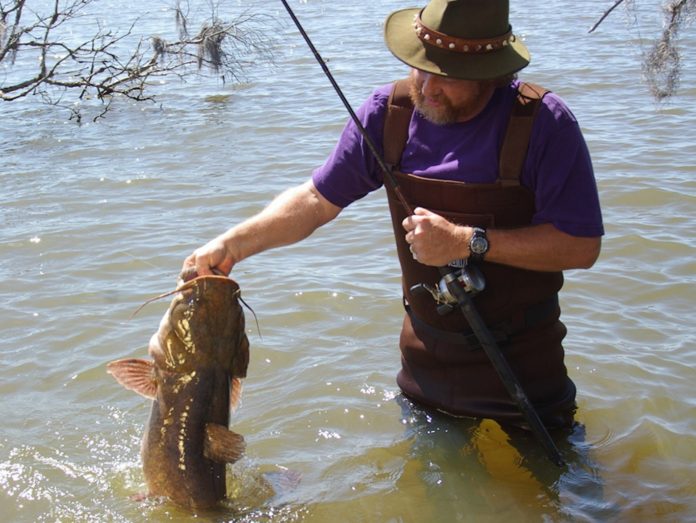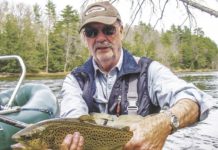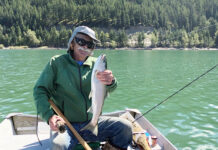KSRW FLY FISHING REPORT
10-08-2021
The Eastern Sierra Fly Fishing Report is brought to you by Fred Rowe owner of Sierra Bright Dot Fly Fishing Guide Service Fred has been teaching, guiding, writing, and lecturing on Eastern Sierra fly fishing since 1982.
Here is this week’s fly fishing report:
The first storm of the winter season, even though it’s Fall, is expected to leave snow on the upper elevation peaks. We need all the precipitation we can get. Eastern Sierra streams and lakes are at their lowest levels of the year. Hatches are moving to a mid-day time frame. You do not need to be in a hurry to get on the water.
Fall in the west is now fire season. Smoke is a problem on any given day. When the winds blow right, or is that wrong, the Eastern Sierra fills with smoke. If you’re lucky you will be here on a day that the skies are blue and we are reminded that there are mountains in the horizon. The Aberdeen Fire south of Big Pine is being mopped up and should not present any problems. Cold nights are turning the leaves yellow. Now is the time to enjoy the turning leaves while you enjoy fly fishing on one of the Eastern Sierra waters.
On the lower Owens River Wild Trout Section water flows are at 400 CFS as DWP sends water to Los Angeles. Once water holding reservoirs south of the Owens Valley are filled back up the river should go to winter flows of between 100 CFS and 200 CFS. For now, the flows are too high to fly fish. You can put lots of lead on your leader to get your flies down and catch and a few fish. Working the banks with heavy nymph outfits produce fish, but for the loss of tackle is not worth the return for me. I will fish the river again when the flows go below 300 CFS.
At Hot Creek interpretive site the morning hatches of mayflies, and caddis are offering fly fishers good dry fly action each day. The morning starts off with tiny mayflies known as tricos. Then gray caddis show up and the morning hatch finishes in the early afternoon with blue wing olive mayflies hatching. The trico hatch is present, but the fish are not feeding on it aggressively. For the fly fishing enthusiast size 22 female parachute tricos, size 22 trico parachutes, and size 22 trico spinners are fooling the wary trout. Size 20 gray caddis patterns like X-caddis, elk hair caddis, EC caddis, and partridge spent caddis are producing trout mid-morning. Late morning into early afternoon is when the blue wing olive may flies begin to hatch. The trout are keying in on this hatch until it ends in the early afternoon.
In the canyon section of Hot Creek Cool weather has thinned out the fly fishers. It is still crowded, but not elbow to elbow anglers like this summer. Gray caddis and blue wing olive mayflies are providing morning hatches that fly fishers can imitate. The dry and dropper technique in the morning before the hatch gets going is producing wild trout. The trico hatch is not very abundant in the faster water sections. Dark winged caddis in size 20 are hard to see on the water. I’m using a dry and dry to make the flies more visible. I use a size 16 parachute Adams with a size 20 gray partridge spent caddis tied onto a three feet tippet of 6X. If I lose sight of the caddis, I can see the Adams and use it like an indicator. I also set to any rising trout that is within three feet of the Adams. Trout are taking gray size 20 X-caddis, elk hair caddis, EC caddis, and partridge spent caddis.
Fly fishing on the upper Owens River above Benton Crossing Bridge are experiencing increased flows to 120 CFS. I like to fish the river at 100 CFS. This influx of water should get the trophy rainbow and brown trout of Crowley Lake to start moving up the river. Fishing with nymphs and streamers in the deep holes and runs is producing trophy trout for anglers willing to cover water looking for pods of trophy trout. Fly patterns need to be fished right on the bottom and this requires lots of weight in the flies or on the leader. Size 12 stoner nymphs and size 12 green/gold Prince nymphs are productive trophy trout producers. Leeches, matukas, wooly buggers, and muddler minnows are producing trophy trout for fly fishers fishing with sink tips.
The upper Owens River flows into Crowley Lake in the north arm of the lake. Fly fishers from boats and float tubes are doing well with midges and balanced leeches. The fish are staging at the mouth of the Owens River as they prepare to head up the river on their annual migration run. The trout are in nine to 12 feet of water and are taking tiger midges, zebra midges, Albino Barron’s, and balanced punk perch.
The upper Owens River below Benton Crossing Bridge is seeing an increase in trophy trout entering the river. The fish are resting in the deep holes as they migrate up river. Fishing nymphs on the bottom with a Euro nymph rig is fooling these trout. Fish with gold ribbed hares ears, brown quilldigons, Butano nymphs, Frenchies, gold/green Prince nymphs, and stoner nymphs. I’m seeing more fish up river in the monument area than in the Mouth of Crowley area.
Bishop Creek Canal located behind the Ford Dealer off of HWY 6 has a trico may fly hatch coming off later in the morning starting around 9:00 A.M. and ending by 10:00 A.M. I’m fishing with a size 16 Adams parachute and a size 18 bead head flash back pheasant tail nymph on three feet of 5X tippet. I’m not sure which is more fun, having the trout attack the Adams on the surface or watching the slight movement in the Adams and setting on a wild brown trout that has taken the nymph. This is my go to spot when I only have an hour or two to fly fish.
This fly fishing report has been brought to you by Fred Rowe of Sierra Bright Dot Fly Fishing Guide Service. Sierra Bright Dot is on Facebook and Instagram.
Related
Credit: Source link































